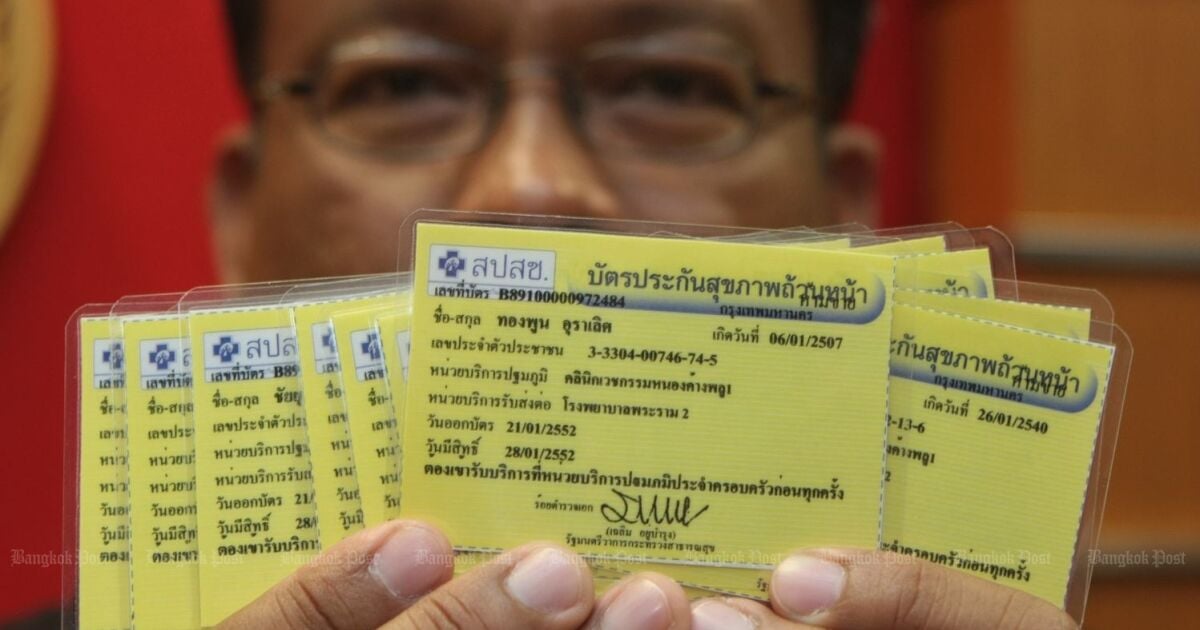30-baht scheme in hot water: is Thailand’s gold card running out of cash?

Thailand’s universal healthcare policy, known as the 30-baht gold card scheme, faces scrutiny over its financial sustainability and adequacy in providing security to all citizens. Health experts call for a reform to ensure the scheme’s long-term viability.
This populist policy, launched by the Pheu Thai Party more than two decades ago, strives to offer equitable medical treatment for Thai citizens, particularly the economically disadvantaged, without the burden of financial stress. Introduced in 2002, the programme initially required a co-payment of 30 baht per visit, a fee that was later abolished, granting cardholders free access to medical services.
However, a network of hospitals and medical staff has raised concerns about the scheme’s impact on state-owned hospitals. Increased patient visits, staff shortages, and financial deficits have become significant issues. The group urged the Ministry of Public Health to intervene, warning that the universal healthcare scheme is at risk of collapsing.
The group highlighted several contributing factors, including rising medical treatment costs, an increasing number of patients with complex illnesses, a growing elderly population, and a shrinking taxpayer base.
Academics and medical experts have echoed the need for reform to secure the scheme’s financial future. Dr Somsak Tiankao from Khon Kaen University’s Srinagarind Hospital reported annual losses of approximately 100 million baht due to an overwhelming patient load. Since the implementation of the cancer everywhere policy, patient numbers have surged by 400%, making it challenging for medical staff to provide adequate care, said Dr Somsak.
“The number of cancer patients annually increased from 6,000 to 25,000, leading to long queues and delayed treatments.”
Ageing society
To offset financial losses, many state-owned hospitals have resorted to establishing special clinics for out-patients and seeking public donations.
Dr Somsak warned that without remedies, his hospital might have to lower its standards, potentially limiting laboratory use and daily patient visits.
“We might face a situation in the next five years where an ageing society exacerbates medical costs due to more complex diseases. Worse, we might see strikes from overworked medical staff.”
He suggested that the new government consider allowing patients under the universal healthcare scheme to pay additional fees beyond the 30-baht co-pay ceiling to alleviate the state’s financial burden.
“Medical treatment should not be free for all; those who can afford better services should be allowed to pay extra.”
Dr Supat Hasuwannakit, president of the Rural Doctor Society, pointed out that the budget allocation for the universal healthcare scheme is about 7% of the 3-trillion-baht fiscal budget, roughly 200 billion baht. Despite an annual increase of 3%, this amount remains insufficient to sustain the scheme.
Emergency funds
Dr Supat proposed that the government provide emergency funds to support state-owned hospitals in the short term and invest more in community and medium-sized hospitals for long-term sustainability.
“The prime minister should upgrade the universal healthcare scheme, a hallmark policy of the party, and design a master plan for healthcare security to ensure sustainable healthcare in the country.”
Nuttanan Wichitaksorn from the Thailand Development Research Institute noted that many hospitals under the Universal Health Scheme and the Social Security Fund have reported significant losses due to inadequate government funding. Nuttanan suggested that the National Health Security Office (NHSO) manage the healthcare budgets for better efficiency.
“There should be some reform to the nation’s healthcare scheme to avoid future financial instability. The scheme is crucial for providing Thai people with access to proper medical treatment.
“We should wait and see what the next steps for the scheme will be.”
The Thailand Development Research Institute recently projected that without promoting healthy lifestyles among the population, the country’s healthcare expenditure could reach 2.2 trillion baht by 2032, reported Bangkok Post.
Latest Thailand News
Follow The Thaiger on Google News:


























